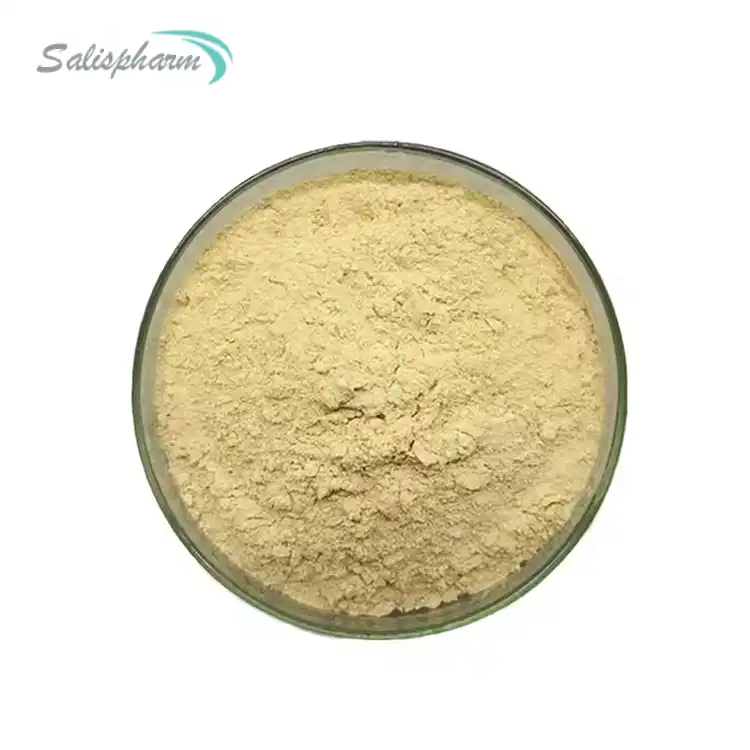Genistein powder, derived from soybeans and other legumes, is a potent isoflavone that has gained attention for its potential health benefits. While it is often associated with women's health due to its phytoestrogen properties, genistein also has significant effects on men's health. This article explores the various ways genistein powder can impact men, from its influence on hormonal balance to its potential role in disease prevention and overall well-being.

Can genistein powder improve prostate health in men?
One of the most significant potential benefits of genistein powder for men is its impact on prostate health. Numerous studies have suggested that genistein may play a crucial role in maintaining a healthy prostate and potentially reducing the risk of prostate-related issues.
Genistein has been shown to inhibit the growth of prostate cancer cells in laboratory studies. This effect is believed to be due to its ability to interfere with the signaling pathways that promote cancer cell growth and proliferation. In particular, genistein has been found to inhibit the activity of tyrosine kinases, enzymes that play a crucial role in cell growth and division.
Furthermore, genistein's antioxidant properties may help protect prostate cells from oxidative stress and DNA damage, which are known contributors to the development of prostate cancer. By neutralizing harmful free radicals, genistein may help maintain the integrity of prostate cells and reduce the risk of mutations that can lead to cancer.
Several epidemiological studies have also suggested that populations with higher soy intake, which is rich in genistein, tend to have lower rates of prostate cancer. For example, Asian countries where soy consumption is high have significantly lower rates of prostate cancer compared to Western countries.
In addition to its potential anti-cancer effects, genistein may also help alleviate symptoms of benign prostatic hyperplasia (BPH), a common condition in older men characterized by an enlarged prostate. Some studies have shown that genistein can inhibit the growth of prostate cells and reduce inflammation, potentially helping to manage BPH symptoms such as frequent urination and difficulty emptying the bladder.
While these findings are promising, it's important to note that more research is needed to fully understand the effects of genistein powder on prostate health in men. Nonetheless, the current evidence suggests that incorporating genistein-rich foods or supplements into one's diet may be beneficial for maintaining prostate health and potentially reducing the risk of prostate-related issues.
Does genistein powder affect testosterone levels in men?
The relationship between genistein powder and testosterone levels in men has been a subject of considerable interest and debate in the scientific community. As a phytoestrogen, genistein has a chemical structure similar to estrogen, which has led to concerns about its potential effects on male hormonal balance.
Some studies have suggested that high doses of genistein might have a mild estrogenic effect, potentially leading to a decrease in testosterone levels. This concern is based on the fact that genistein can bind to estrogen receptors in the body, albeit with a much weaker affinity than natural estrogen. In theory, this could lead to a slight suppression of testosterone production.
However, the actual impact of genistein on testosterone levels in men appears to be more complex and nuanced. Many studies have found no significant effect of genistein supplementation on testosterone levels in healthy adult men. For instance, a meta-analysis of 15 placebo-controlled studies concluded that neither soy protein nor isoflavone intake significantly affected testosterone levels in men.
Interestingly, some research has even suggested that genistein might have a positive effect on testosterone levels in certain situations. For example, studies on animal models have shown that genistein can help protect Leydig cells (the testosterone-producing cells in the testes) from oxidative stress and damage. This protective effect could potentially help maintain healthy testosterone production, especially as men age.
Moreover, genistein's potential to inhibit the enzyme aromatase, which converts testosterone to estrogen, might actually help maintain higher testosterone levels in some men. By reducing the conversion of testosterone to estrogen, genistein could theoretically help preserve testosterone levels.
It's also worth noting that the effects of genistein on testosterone may vary depending on factors such as dosage, individual metabolism, and overall health status. Some men may be more sensitive to the effects of phytoestrogens than others, and the impact may also depend on existing hormone levels and overall endocrine function.
In conclusion, while concerns about genistein's effects on testosterone levels are understandable, the current scientific evidence does not support the idea that moderate consumption of genistein significantly lowers testosterone levels in healthy men. However, as with any supplement, it's always advisable to consult with a healthcare professional before adding genistein powder to your regimen, especially if you have concerns about hormonal balance.
How can genistein powder contribute to men's overall health and longevity?
Genistein powder has garnered attention not only for its potential benefits to prostate health and its effects on hormonal balance but also for its broader implications for men's overall health and longevity. This isoflavone compound has been associated with various health-promoting effects that could contribute to improved well-being and potentially extended lifespan in men.
One of the primary ways genistein powder may contribute to men's health is through its potent antioxidant properties. Oxidative stress, caused by an imbalance between free radicals and antioxidants in the body, is a significant contributor to aging and various chronic diseases. Genistein has been shown to neutralize harmful free radicals, potentially reducing oxidative damage to cells and tissues throughout the body. This antioxidant effect may help protect against age-related cellular damage and support overall health and longevity.
Genistein has also demonstrated anti-inflammatory properties, which could be beneficial for men's health. Chronic inflammation is associated with numerous health issues, including cardiovascular disease, diabetes, and certain types of cancer. By helping to modulate inflammatory responses in the body, genistein may contribute to reducing the risk of these chronic conditions and promoting overall health.
Cardiovascular health is another area where genistein may offer significant benefits for men. Studies have suggested that genistein can help improve lipid profiles by reducing LDL (bad) cholesterol levels and increasing HDL (good) cholesterol. Additionally, genistein may help improve vascular function and reduce the risk of atherosclerosis. These cardiovascular benefits could contribute to a reduced risk of heart disease, which remains a leading cause of death among men.
Bone health is often overlooked in men's health discussions, but it's an important aspect of overall well-being and longevity. Genistein has shown potential in supporting bone health by promoting bone formation and inhibiting bone resorption. This could be particularly beneficial for older men, who are at increased risk of osteoporosis and fractures.
Genistein's potential cognitive benefits are also worth noting. Some studies have suggested that genistein may have neuroprotective effects, potentially helping to maintain cognitive function as men age. By protecting neurons from oxidative stress and inflammation, genistein could contribute to brain health and potentially reduce the risk of age-related cognitive decline.
Furthermore, genistein's potential role in metabolic health could have significant implications for men's overall health and longevity. Some research has indicated that genistein may help improve insulin sensitivity and glucose metabolism, which could be beneficial in managing or preventing type 2 diabetes. Given the increasing prevalence of metabolic disorders in men, this aspect of genistein's effects could be particularly relevant.
It's important to note that while these potential benefits are promising, more research is needed to fully understand the long-term effects of genistein supplementation on men's health and longevity. The optimal dosage and duration of use for achieving these health benefits are still subjects of ongoing research.
Conclusion
Genistein powder shows promise in contributing to men's overall health and potentially supporting longevity through its antioxidant, anti-inflammatory, cardiovascular, bone-supporting, neuroprotective, and metabolic effects. However, as with any supplement, it's crucial to approach its use as part of a broader health strategy that includes a balanced diet, regular exercise, and overall healthy lifestyle choices. Men interested in incorporating genistein powder into their health regimen should consult with healthcare professionals to ensure it's appropriate for their individual needs and health status.
If you are also interested in this product and want to know more product details, or want to know about other related products, please feel free to contact sasha_slsbio@aliyun.com.

References
1. Messina, M. (2010). Soybean isoflavone exposure does not have feminizing effects on men: a critical examination of the clinical evidence. Fertility and sterility, 93(7), 2095-2104.
2. Mahmoud, A. M., Yang, W., & Bosland, M. C. (2014). Soy isoflavones and prostate cancer: a review of molecular mechanisms. The Journal of steroid biochemistry and molecular biology, 140, 116-132.
3. Andres, S., Abraham, K., Appel, K. E., & Lampen, A. (2011). Risks and benefits of dietary isoflavones for cancer. Critical reviews in toxicology, 41(6), 463-506.
4. Behl, C. (2002). Oestrogen as a neuroprotective hormone. Nature Reviews Neuroscience, 3(6), 433-442.
5. Jiang, Y., Gong, P., Madak-Erdogan, Z., Martin, T., Jeyakumar, M., Carlson, K., ... & Katzenellenbogen, J. A. (2013). Mechanisms enforcing the estrogen receptor β selectivity of botanical estrogens. The FASEB Journal, 27(11), 4406-4418.
6. Ganai, A. A., & Farooqi, H. (2015). Bioactivity of genistein: A review of in vitro and in vivo studies. Biomedicine & Pharmacotherapy, 76, 30-38.
7. Adlercreutz, H. (2002). Phyto-oestrogens and cancer. The Lancet Oncology, 3(6), 364-373.
8. Setchell, K. D., & Cassidy, A. (1999). Dietary isoflavones: biological effects and relevance to human health. The journal of nutrition, 129(3), 758S-767S.
9. Kuiper, G. G., Lemmen, J. G., Carlsson, B. O., Corton, J. C., Safe, S. H., Van Der Saag, P. T., ... & Gustafsson, J. Å. (1998). Interaction of estrogenic chemicals and phytoestrogens with estrogen receptor β. Endocrinology, 139(10), 4252-4263.
10.Dixon, R. A., & Ferreira, D. (2002). Genistein. Phytochemistry, 60(3), 205-211.

